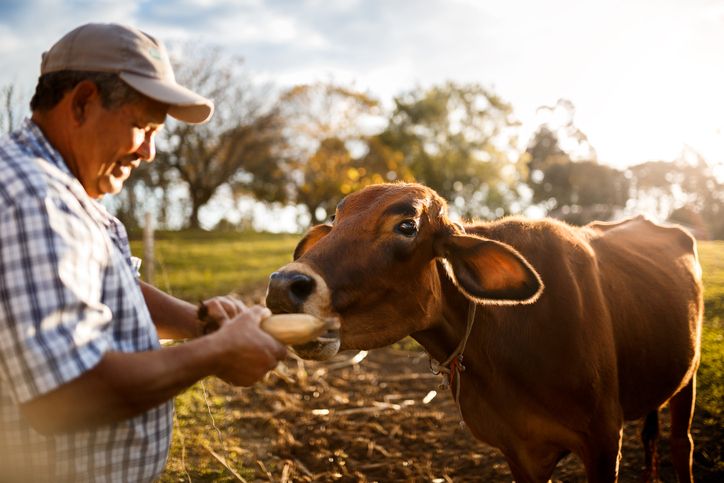Royal DSM has secured regulatory approval to commercialize its feed supplement which reduces livestock methane emissions in Brazil — the world’s biggest beef exporter — and Chile.
The market authorizations are the first that the Dutch chemicals giant has secured for Bovaer, and enable the additive to be sold to farmers raising beef and dairy cattle, as well as sheep and goats, in the two countries.
DSM says that a quarter-teaspoon of Bovaer administered per cow, per day can reduce enteric methane emissions by about 30% for a dairy animal and up to 90% for beef cattle, based on trials conducted in Australia.
A beef trial carried out by São Paulo State University in Brazil between 2016 and 2017 found that Bovaer reduced enteric methane emission reductions by 55%.
According to Beef Central, Bovaer’s active ingredient is 3-nitrooxypropanol, an organic compound which inhibits an enzyme that contributes to the production of methane in ruminant digestive systems.
It gets to work as soon as the animal eats the supplement. After it has done its job, it breaks down into compounds that are already naturally present in the ruminant stomach.
DSM claims that Bovaer is “the most extensively studied and scientifically proven solution to the challenge of burped methane to date.”
The sixth assessment report from the Intergovernmental Panel on Climate Change, published last month, highlighted the importance of slashing methane emissions amid the wider effort to reduce greenhouse gas emissions.
Methane is more effective at trapping heat than carbon dioxide, making it more ‘potent.’ However, it vanishes from the atmosphere much more quickly. As such, sharp reductions in methane emissions could result in faster mitigation of anthropogenic climate change over the near term.
In the US alone, enteric methane from livestock accounted for over a quarter of total methane emissions in 2019.
“The recent IPCC’s climate change report is a massive wake-up call for us all about the irreversible power of global warming,” Mark van Nieuwland, program director at DSM, said in a statement.
“In it, the IPCC also stated that a rapid reduction of methane emissions could reduce the spread of global warming in the near term and have a positive effect on air quality. We know the agricultural and livestock sectors recognize this opportunity for change and are eager to act.”
DSM isn’t the only company to have come up with a feed additive solution for the cow burp problem.
Australia’s national research agency, CSIRO, has formed a joint venture with retail giant Woolworths, commodities handler GrainCorp, agrifood group Harvest Road, and tech accelerator AGP Sustainable Real Assets–Sparklabs Cultiv8 to commercialize feed additive technology it developed in partnership with Meat & Livestock Australia and James Cook University.
Named FutureFeed, the supplement contains Asparagopsis seaweed, which has been shown to reduce enteric methane emissions by as much as 80%.
Switzerland’s Mootral has produced a methane-reducing supplement based on garlic and citrus extract, and is helping farmers cash in on it by helping them to sell carbon credits. US fast food giant Burger King is asking some of its beef farmers to feed their cows with lemongrass, which can reportedly reduce enteric methane by a third.





